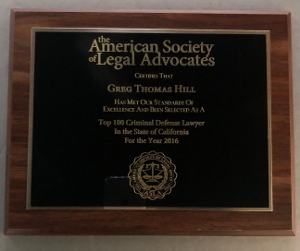For certain crimes, a person in custody is eligible to receive two days of “good time, work time” credit for each two days in custody. Most drug offenses, for example, are eligible for such generous credit because they are not violent and not serious offenses. For other more serious or violent crimes, a person in custody may only receive fifteen percent “credit” for time served.
The Point of This Article: After AB109 came into effect, there was frequent confusion on how to calculate pre-sentence credits, taking into account Senate Bills 18 and 76 – and furthermore, as in the case summarized below, whether Assembly Bills 17 and 117 applied as well.
However, since 2009, there have been no less than five legislative changes to the way presentence conduct credits are calculated, leaving even the most informed judges, district attorney and defense attorneys confused when dealing with certain types of offenses and the pre-sentence credit earned.
The recent case of
People v. Paul Garcia (2012 DJDAR 13257 (Sept. 24, 2012)) serves to clarify the law on this important issue.

On May 28, 2010, Paul Garcia allegedly made criminal threats, a violation of Penal Code § 422. Section 422 is considered a “Strike Offense,” or a serious and violent felony requiring the convicted individual to serve a minimum of 85% of the sentence. Garcia also had a prior serious felony conviction, although the opinion did not describe what this was.
On January 26, 2010, Garcia was found guilty and sentenced to six years and four months in prison. Garcia had been in custody for 244 days prior to being sentenced. The question was how much presentence credit beyond 244 days should be applied to his sentence for good conduct and agreeing to perform labor as directed by the sheriff.
Due to the defendant’s prior conviction for a serious felony, but not a violent felony, the Second Appellate District ruled that Mr. Garcia would only be eligible for two days of conduct credit for every four days served in presentence custody. This is less than the two-for-two credit that often does apply.
The appellate court was deliberate in stressing that its ruling was strictly limited to the facts of Garcia’s case and specifically, the offenses he was charged with and the dates of the offenses. However, the appellate court offered a comprehensive review of the history of presentence conduct credit and the last five legislative enactments and their applicability (Senate Bill 18, Senate Bill 76, Assembly Bill 109, Assembly Bill 117 and Assembly Bill 17).

As applied to Mr. Garcia, the court noted that the alleged criminal threats occurred on May 28, 2010. Senate Bill 18 therefore applied and in some cases, provided two days of conduct credit for each two days of custody. However, Garcia was ineligible for such generous credit because he was awaiting trial on a serious felony. Thus, Garcia was only eligible for two days credit for each four days served.
Moreover, by the time Garcia was sentenced, Senate Bill 76 had become effective, repealing the two-for-two credit scheme applicable earlier.
The appellate court commented that nothing in the AB109 criminal justice realignment act affected pre-custody credits for Garcia. In other words, while AB109 did change prison sentences to county jail sentences for, with certain exceptions, non-violent and non-sex offenders with sentences of five years or less, it did not change how presentence credits are calculated for Garcia.
The court also clarified that Assembly Bill 117, enacted on June 30, 2011, only applied prospectively, not retroactively to change Garcia’s credits. Likewise, the court commented that Assembly Bill 17, signed into law on September 17, 2011 only applied prospectively, so it was also unavailing to Garcia.
The appellate court thus granted Garcia 122 days of conduct credit in addition to his 244 days of actual credit for a total of 366 days.
Postscript: The above article was written in 2012. Since then, Prop 57 was passed. Prop 57 allows certain qualified prisoners to earn extra custody credit for reaching certain “Milestones” by completing certain approved rehabilitative or educational programs. Prisoners can also earn extra custody credits through rehabilitative achievement credits and educational merit credits. We suggest the reader look further into our article on this website concerning Prop 57 and increased custody credits.
For more information about sentencing, click on the following articles:
- Resentencing a Three Strikes Sentence Often Involves Difficult Document Gathering Challenges
- A Principal in Disturbing the Peace May Be Sentenced to 25- Years-To-Life for Attempted Murder That Follows
- Adult Convicted of Resisting Arrest May Not Serve Sentence in County Jail Because of Juvenile Strike
Contact Greg Hill & Associates

